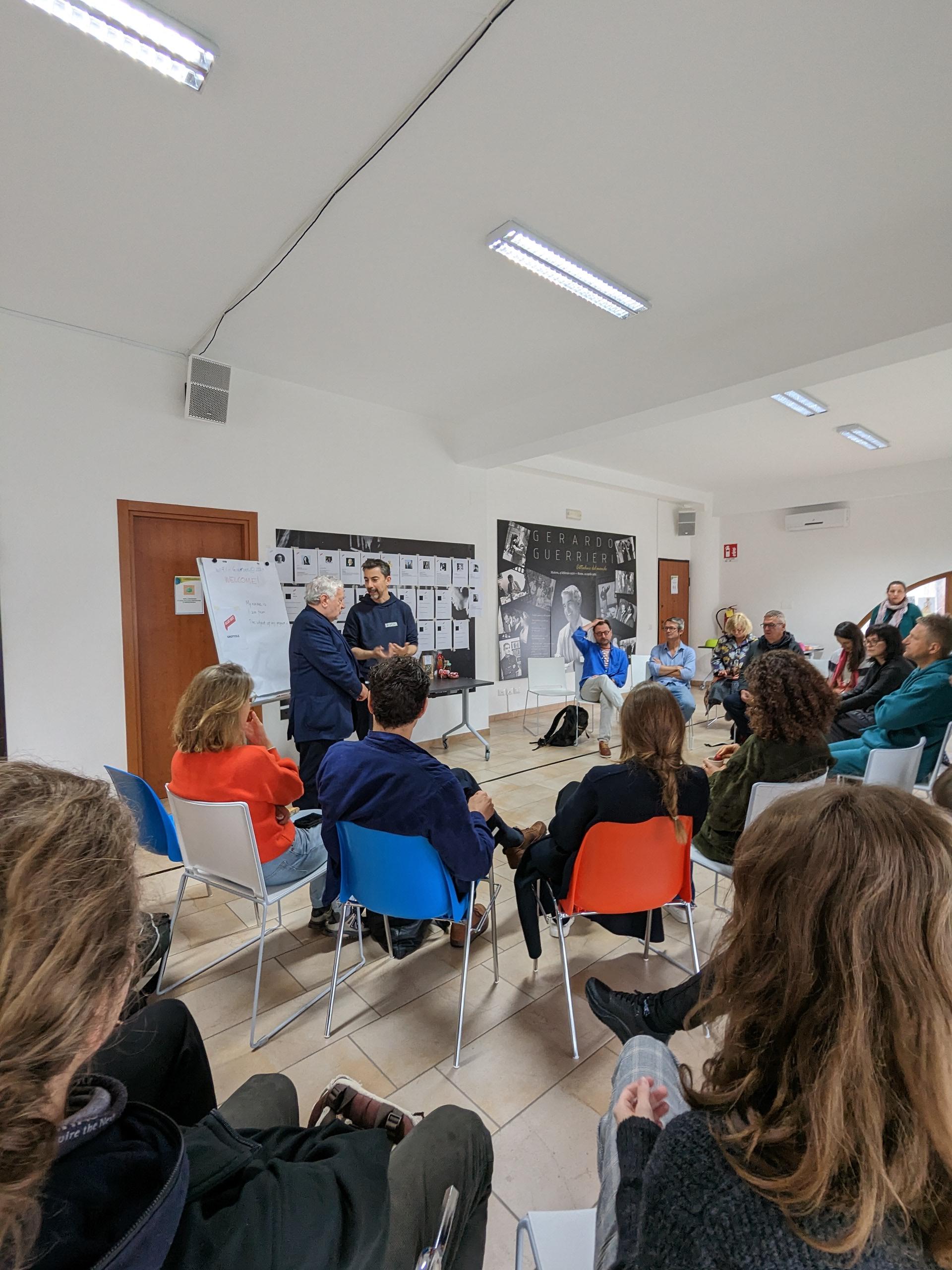Nearly a third of Europeans live in rural areas; in Italy alone there are more than 5,500 villages with fewer than 5,000 inhabitants. In these areas, where services and opportunities are often lacking, there are people working daily to create new opportunities for local communities.
The Open School for Village Hosts is a project born from the intuition of John Thackara, Casa Netural and the partner organizations to give a name and recognition to these new professionals who unite urban and rural communities by creating new connections and contamination.
A Village Host cares for the environment, local culture, and local communities by helping to ensure the well-being of ecosystems and natural resources. They are artists, cooks, farmers, and creative people who generate impact for communities.
From May 15 to 19, 18 community activators from different European countries gathered in Grottole (Italy) for the first time, as part of the Open School for Village Hosts European Training. This event was the culmination of a two-month online training, during which participants had the opportunity to deepen their knowledge and skills and involved 14 expert trainers selected by Casa Netural (Italy), Materahub (Italy), Elisava (Spain), CDOP (Serbia), KobieTY Lodz (Poland) and Radosa Parteriba (Latvia).
During the mornings, designed by the trainers John Thackara (Casa Netural) and Aija Freimane (Radosa Partenariba), participants took part in mentoring and peer-to-peer sessions. These sessions offered them the opportunity to work on their own ideas and projects while receiving advice and feedback from the trainers and other participants. This mentorship and peer-to-peer exchange approach fostered personalized growth and development, allowing participants to refine their proposals.
During the mentoring sessions, participants were able to deepen their ideas and receive practical advice on how to turn them into concrete projects. The trainers, with their experience and expertise, provided valuable suggestions on aspects such as planning, resource management, and project promotion.
Peer-to-peer sessions, on the other hand, provided an opportunity for participants to interact with each other, exchange experiences and learn from others. This mutual exchange of knowledge and perspectives enriched the training, enabling participants to gain new perspectives and develop a network of contacts and collaborations.
The first day of training the participants presented themselves and their projects to the trainers and the local stakeholders answering to three questions:
the name and location of my project is
who benefits from my project is
how it will be implemented is
The mentoring session and peer to peer sessions were interspersed with “me times”, when practitioners had the chance to spend time by themselves in order to reframe and improve their idea and implement the suggestions received, and “we times” to brainstorm their idea together with peers and trainers, in preparation for the final pitch held on the last day, when practitioners gave a public pitch of their project. In 5 minutes they re-presented their project in light of what they learned during the training in a public event open to all stakeholders and trainers, answering their questions.
This methodological approach, based on mentoring sessions and peer to peer, provided participants with a stimulating and interactive environment to develop their own ideas and projects. Through this format, Village Hosts had the opportunity to share their experiences, learn from others, and make meaningful connections. This was an important step forward in the goal of increasing the social and rural impact of these professionals who work for the well-being of local communities.
In the afternoons, participants devoted their time to a “Village Host Community Challenge.” This activity, designed by Justyna Turek (Holis) and Nora Freimane (Radosa Partenariba), with the goal of working as a group, creating a “community of practice” and actively engaging the local community, offered a shared challenge aimed at generating positive impact.
Practitioners were divided into 4 subgroups / topics:
menus, gathering food, and resources for cooking;
invitations to the local community and other guests;
event location;
hosting the event.
So as to give them the opportunity to work together on one aspect of the event organization, strengthening the ties between them.
Participants collaborated with the community to identify and address a specific challenge, working together to find innovative and lasting solutions. The end result of this challenge was reached with a community celebration, involving not only the participants, but also the community of Grottole.
A not insignificant aspect, which played an important role, was the quality time spent together among the participants in the Grottole setting, where the nonprofit Wonder Grottole served as a case study of rural innovation by showcasing its activities. Shared lunches and dinners also created a convivial atmosphere that sparked new exchanges of ideas and collaborations among participants, building bridges between different rural areas in Europe. These strong ties that have arisen from the European Training of the Open School for Village Hosts have created the basis for the emergence of a movement of village hosts who, through the platform that project partner Elisava is working on, will be able to continue exchanging advice even at a distance.
For further reading on this topic, check out these related articles: The Village Connection – a team’s reflection & reaffirmation




 Co-funded by the Erasmus+ Programme of the European Union
Co-funded by the Erasmus+ Programme of the European Union